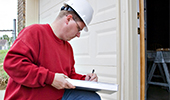

HUD USER Home > Energy-Efficient and Healthy Homes > Home Energy & Health Assessments
Home Energy & Health Assessments
 Consumers interested in improving their home’s energy performance and indoor air quality should consider starting with an assessment of their home’s energy use and air quality. These assessments will identify the range of energy and air quality issues in the home as well as help with selecting effective and affordable solutions. A home energy audit involves identifying the locations where air is leaking; checking the insulation; and inspecting fuel-burning appliances and heating, ventilation, and cooling equipment to ensure that they are working properly.
Consumers interested in improving their home’s energy performance and indoor air quality should consider starting with an assessment of their home’s energy use and air quality. These assessments will identify the range of energy and air quality issues in the home as well as help with selecting effective and affordable solutions. A home energy audit involves identifying the locations where air is leaking; checking the insulation; and inspecting fuel-burning appliances and heating, ventilation, and cooling equipment to ensure that they are working properly.
Consumers can conduct a do-it-yourself energy audit or hire a professional home energy auditor to get a detailed assessment of their home’s energy use and identify energy-saving measures. Using specialized techniques and equipment, a professional auditor closely examines insulation and ventilation systems, locates air leaks, measures the air infiltration rate, and identifies other areas of energy loss as well as sources of certain indoor air pollutants. In addition, a professional auditor can recommend energy-saving measures such as adding the correct type and amount of insulation, using air-sealing techniques, installing energy-efficient fixtures and appliances, and taking steps to improve and maintain good air quality.
The energy offices of state or local governments may be able to help consumers find professional auditors. Utility companies may also conduct residential energy assessments or recommend local auditors. In addition, the Residential Energy Services Network, ENERGY STAR, and the Building Performance Institute have compiled online directories of certified home energy professionals.
Home energy assessment tools such as DOE’s Home Energy Score, EPA's Home Energy Yardstick, the ENERGY STAR Home Advisor, and Residential Energy Services Network's Home Energy Rating System (HERS) Index help consumers better understand their home’s energy performance and identify appropriate energy-efficiency measures.
DOE’s Home Energy Score measures the energy performance of single-family homes and townhomes. A Home Energy Score Qualified Assessor collects information on the home, including its structure and mechanical systems, and determines the home’s energy score. Based on this information, assessors can compare a home’s energy efficiency with that of similar homes. The assessor can also recommend energy-efficiency improvements, predict how these energy upgrades would improve the home’s score, and estimate the associated costs and future savings of these improvements. Assessors are provided by DOE’s official Home Energy Score Partners in selected locations only, although DOE plans to expand the program. In areas where the Home Energy Score program is not available, consumers can contact their local utility or state energy office for information on the program’s future availability.
In addition to improving the energy performance of their homes, consumers should assess their homes’ air quality to ensure a healthy indoor environment and check whether any air pollutants exist in high concentrations indoors. Information on assessing radon levels in homes is described in the “Radon” section of this website. For advice on monitoring other indoor pollutants, consumers should consult the regional or state agency or professionals experienced with air quality issues.
